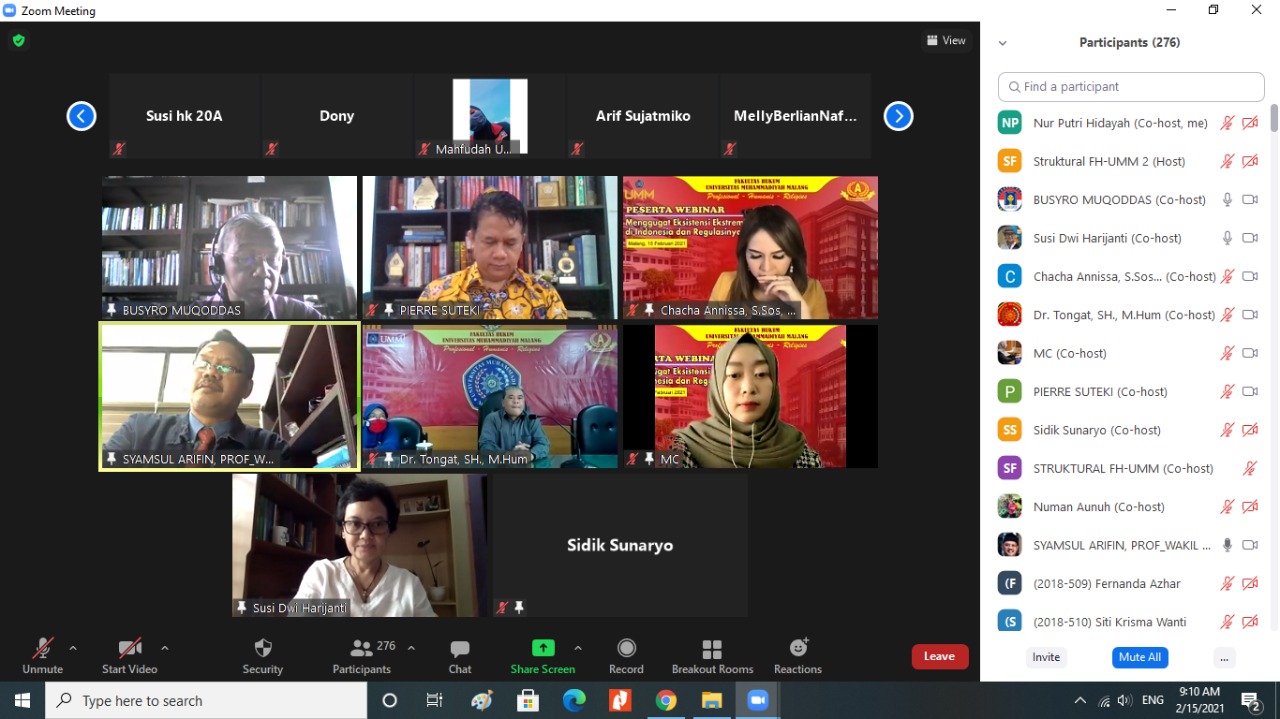Protecting NKRI from the Existence of Extremism, Faculty of Law UMM Holds Webinars and Invites Experts

Malang (15/2) - The existence of extremism has made many elements of society have to be introspective. The presence of regulations that address extremism has also become a separate discussion space for academics. This background becomes a reality that strengthens the efforts of the Faculty of Law, University of Muhammadiyah Malang (Faculty of Law UMM) to hold webinars and invite experts to discuss together.
Taking place in Zoom's virtual room, the webinar agenda with the theme of Challenging the Existence of Extremism in Indonesia and its Regulations, was held on Monday, February 15, 2021. The webinar presented experts and practitioners, such as: Prof. Dr. Suteki, SH., M.Hum (Professor of the Faculty of Law UNDIP), Dr. Sidik Sunaryo, SH., M.Si., M.Hum (UMM Vice Rector IV) and Prof. Dr. Susi Dwi Harijanti, SH., LL.M., Ph.D (Professor of the Faculty of Law UNPAD), guided by the moderator Chacha Annissa, S.Sos., M.Si (TV One Journalist).
Also attending as a Keynote Speaker, Dr. H.M. Busyro Muqoddas, SH., MH (Chairman of the Muhammadiyah Central Pimpina). Dr. Busyro Muqoddas recounts his experience accompanying victims of arrogance and repressiveness of the apparatus since the New Order era until now. Through this experience, Dr. Busyro Muqoddas, asked law enforcers to be more careful in accusing someone with radical, extremist labels and the like.
"So far, why have they always been labeled as radicals. Only Muslims have often been made permanent defendants since the New Order until now. What is wrong with Muslims, Islam? What is the source of extremism in Indonesia? These questions need to be answered, so that not become a gripping historical legacy. " Said Dr. H.M. Busyro Muqoddas.
Other presenters and experts also added that the parameters to determine whether someone is involved or suspected of being radical, needs to be reformulated. Neither radicalism nor extremism can be judged by one's appearance or dress. Thus, related regulations, both in the form of Laws, Perppu and other positive legal norms, need to be further examined.
"The material is interesting and very comprehensive. Often we get information from media that are sometimes not appropriate, both in terms of regulations and practices. So, through this webinar, we can understand how best to do to prevent the development of extremism in Indonesia." Said M. Lutfi, a webinar participant.
The webinar ended at noon, at the end of the presentation session, participants were given the opportunity to discuss and have direct dialogue with the speakers. It is hoped that through these webinars and academic dialogues, the existence of extremism can be prevented and society will also be protected from being labeled as inappropriate extremism. (saf / hum)
